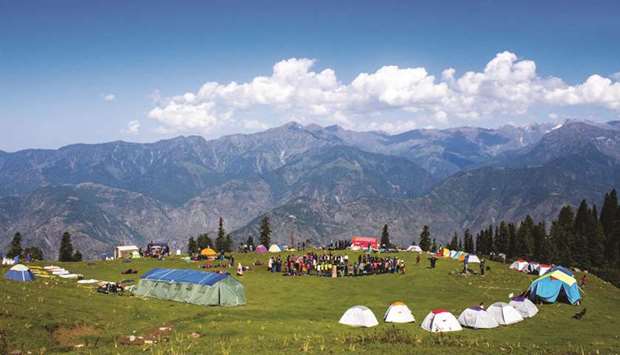A youth, when at home, should be filial and, abroad, respectful to his elders. He should be earnest and truthful. He should overflow in love to all and cultivate the friendship of the good. When he has time and opportunity, after the performance of these things, he should employ them in polite studies. This was once said by Chinese philosopher Confucius.
It is universally believed that youth hold the future of the world and they need to be trained accordingly at their most formative years.
This is the spirit with which Abdul Samad Khan lives. A Pakistani corporate adventure trainer, and social entrepreneur, Abdul Samad has devoted himself to the cause of youth leadership training – a change that was ushered in his life after he survived cancer.
A trainer of international recognition, Samad considers youth empowerment as a purpose of life that inspires him to help young people discover and maximise their potential. He is currently in Qatar and has been sharing his expertise and experiences at different social and professional forums of the Pakistani community.
Community recently sat with the passionate dreamer who expressed strong belief to live an impactful life for himself and others.
The founder and CEO of Youth Impact, a not-for-profit organisation that focuses on social leadership development among youth, said: “For the last seven years, we have been working on youth leadership development. Our mission is to develop purposeful and character-based young social leaders. Our methodology is to have nature and wilderness-based youth development programmes. We take the youth to wilderness and through adventurous activities, involve them in practical experiences and challenges.”
The organisation runs an annual event with the name of ‘Markhor’ – Pakistan’s premium wilderness based youth leadership development conference held annually in the Himalayas.
“The project is inspired by the national animal of Pakistan that is Markhor. We have derived the spirit of Markhor that revolves around self-pride, resilience, strong character, adaptability, resourcefulness, and survival instinct. Every year from Pakistan and other countries, we select 100 young boys and girls – ageing 17 to 24 years. In the last six years, we have trained 539 young people. We had our first conference in 2013.
“The five-day experience carries components such as adventure, hiking, camping, and survival skills. We also inculcate leadership skills and mindset. Thirdly, we create a sense of togetherness among the participants to build a community. We also invite Pakistani social leaders and role-models and they spend time with the youth. This year the conference will take place at Shogran in Kaghan valley from October 2 to 6. The youth after completing the programme has to work with some social enterprise in Pakistan for three months.”
Further elaborating the concept, Abdul Samad, who has so far conducted youth leadership trainings in Australia, USA, UK, Turkey, Sri Lanka, Tanzania, and Malaysia besides Pakistan, said: “We have a vision for 2030 Pakistan. Through this programme, we want to have trained youth assuming different leadership roles. We are cultivating among the youth a sense of purpose and culture of giving back to the society.”
An IT graduate, long-time corporate trainer and certified ‘Train the Trainer’, Samad saw a change in the purpose of his life after he survived cancer. “The disease, the treatment and survival actually changed my whole outlook towards the life. I decided to focus more on training the young people instead of training the corporate leaders. It gave a purpose to my life. Secondly, I noticed that there has been a lot of focus on youth training in the world, especially in the developed countries. So, I decided to do something for the Pakistani youth. So far, I have trained about 23, 000 young people through different programmes. I am running a programme for high school students called ‘Learning ka Wheel’ or Wheel of Learning. Our yet another programme is ‘Chasing Show Leopard’ where the young people are taken to snow covered areas and taught how to survive. Our ‘It Is Outdoor Karachi’ programme focuses on underprivileged young people. We also run course for madrasa students and jail inmates.”
Abdul Samad, who also sees these training programmes as his spiritual journey, further said: “To formulate leadership training courses for different levels, we studied the life of Prophet Muhammad (Peace Be Upon Him) dividing into three phases. The first phase was from his birth to when he was 20-year-old. The second phase was from 20 to 40 years of his life and the third from 40 year to the year of his death. We picked his leadership characteristics from all his life and designed the course for different age-groups.”
About his visit to Qatar, Abdul Samad said: “I wanted to introduce my concept to the Pakistani community here. We have had very fruitful discussions and meetings at different forums. We believe that if we got an opportunity, we can start our programmes for the youth in Qatar as well.”

KAGHAN VALLEY: Markhor conference at Paye Meadows, Kaghan valley, Pakistan.
